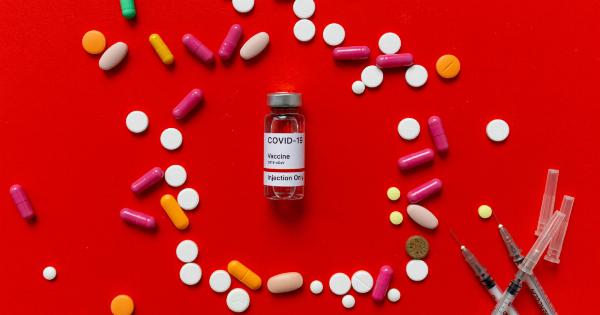Gut health refers to the balance of microorganisms that live in the digestive tract. These microorganisms include bacteria, fungi, and viruses that aid in digestion, nutrient absorption, and overall health.
When the balance of these microorganisms is disrupted, it can lead to various health problems.
30 Medicines that Affect Gut Health
1. Antibiotics
Antibiotics are prescribed to fight bacterial infections, but they can also kill off beneficial bacteria in the gut, which can lead to digestive problems, such as diarrhea, constipation, and bloating.
Some antibiotics may also lead to the overgrowth of harmful bacteria, such as Clostridium difficile, which can cause severe diarrhea and inflammation of the colon.
2. Proton Pump Inhibitors (PPIs)
PPIs are commonly used to treat acid reflux and heartburn. They work by reducing the amount of acid produced in the stomach.
However, reducing stomach acid can also reduce the amount of acid that kills harmful bacteria in the gut, leading to an overgrowth of bacteria and digestive problems.
3. Nonsteroidal Anti-Inflammatory Drugs (NSAIDs)
NSAIDs, such as aspirin and ibuprofen, are commonly used to treat pain and inflammation. However, they can also irritate the lining of the stomach and intestines, leading to inflammation and digestive problems.
4. Corticosteroids
Corticosteroids are often prescribed to reduce inflammation in the body, such as in autoimmune diseases like Crohn’s disease and ulcerative colitis.
However, they can also disrupt the balance of beneficial bacteria in the gut and increase the risk of infections such as C. difficile.
5. Immunosuppressants
Immunosuppressants are used to reduce the activity of the immune system, which can be overactive in autoimmune diseases. Unfortunately, this also makes the body more vulnerable to infections, including those in the gut.
6. Antacids
Antacids are used to neutralize stomach acid and are often used to treat heartburn and acid reflux.
However, reducing stomach acid can also reduce the amount of acid that kills harmful bacteria in the gut, leading to an overgrowth of bacteria and digestive problems.
7. Laxatives
Laxatives are used to treat constipation by stimulating bowel movements. However, prolonged and excessive use of laxatives can disrupt the balance of bacteria in the gut and lead to digestive problems, such as diarrhea and bloating.
8. Chemotherapy drugs
Chemotherapy drugs are used to kill cancer cells, but they can also damage healthy cells, including those in the digestive tract. This can lead to various digestive problems, such as nausea, vomiting, diarrhea, and constipation.
9. Antidepressants
Antidepressants are used to treat depression, anxiety, and other mental health conditions.
However, some types of antidepressants can also affect the balance of bacteria in the gut and lead to digestive problems, such as diarrhea, constipation, and bloating.
10. Antihistamines
Antihistamines are commonly used to treat allergies and cold symptoms. However, they can also cause constipation, digestive problems, and disrupt the balance of bacteria in the gut.
11. Steroids
Steroids are used to reduce inflammation in the body and are often prescribed for conditions such as asthma, arthritis, and lupus.
However, long-term use of steroids can lead to digestive problems, such as ulcers and inflammation in the digestive tract.
12. Birth Control Pills
Birth control pills contain hormones that can affect the balance of bacteria in the gut and increase the risk of digestive problems, such as diarrhea, constipation, and bloating.
13. Diuretics
Diuretics are used to treat high blood pressure and edema by increasing fluid output from the body. However, they can also cause dehydration, constipation, and disrupt the balance of bacteria in the gut.
14. Blood Thinners
Blood thinners are used to prevent blood clots and are often prescribed to people at risk of heart disease and stroke.
However, they can also increase the risk of bleeding in the digestive tract and cause digestive problems, such as diarrhea and constipation.
15. Anti-Seizure Medications
Anti-seizure medications are used to treat seizures and also have other uses, such as treating bipolar disorder and migraine headaches. However, they can also cause digestive problems, such as constipation, diarrhea, and nausea.
16. Opioids
Opioids are used to treat moderate to severe pain, but they can also cause constipation and other digestive problems by slowing down the digestive tract.
17. Antipsychotics
Antipsychotics are used to treat various mental health conditions, such as schizophrenia and bipolar disorder. However, some types of antipsychotics can cause digestive problems, such as constipation and weight gain.
18. Antifungal Medications
Antifungal medications are used to treat fungal infections, but they can also affect the balance of bacteria in the gut and lead to digestive problems, such as diarrhea and bloating.
19. Statins
Statins are used to lower cholesterol levels and reduce the risk of heart attack and stroke. However, they can also cause digestive problems, such as constipation and bloating, and affect the balance of bacteria in the gut.
20. Anticholinergics
Anticholinergics are used to treat various conditions, such as overactive bladder and chronic obstructive pulmonary disease (COPD). However, they can also cause digestive problems, such as constipation and nausea.
21. ACE Inhibitors
ACE inhibitors are used to treat high blood pressure and heart failure. However, they can also cause digestive problems, such as diarrhea and constipation, and affect the balance of bacteria in the gut.
22. Beta-Blockers
Beta-blockers are used to treat high blood pressure, heart disease, and migraines. However, they can also cause digestive problems, such as constipation and diarrhea, and affect the balance of bacteria in the gut.
23. Hormone Replacement Therapy (HRT)
HRT is used to treat symptoms of menopause, such as hot flashes and vaginal dryness. However, it can also affect the balance of bacteria in the gut and cause digestive problems, such as constipation and bloating.
24. Anticoagulants
Anticoagulants are used to prevent blood clots and are often prescribed to people at risk of heart disease and stroke.
However, they can also increase the risk of bleeding in the digestive tract and cause digestive problems, such as diarrhea and constipation.
25. Thyroid Medications
Thyroid medications are used to treat an underactive thyroid gland. However, they can also cause digestive problems, such as constipation and diarrhea.
26. Acne Medications
Acne medications, such as isotretinoin, can cause digestive problems, such as diarrhea, constipation, and inflammation in the digestive tract.
27. Anti-Anxiety Medications
Anti-anxiety medications, such as benzodiazepines, can cause digestive problems, such as constipation and nausea.
28. Blood Pressure Medications
Blood pressure medications, such as alpha-blockers and calcium channel blockers, can cause digestive problems, such as constipation and diarrhea.
29. Parkinson’s Disease Medications
Parkinson’s disease medications, such as levodopa, can cause digestive problems, such as constipation and nausea.
30. Contraceptives
Various forms of contraceptives, such as condoms and intrauterine devices (IUDs), can affect the balance of bacteria in the gut and lead to digestive problems, such as constipation and bloating.





























